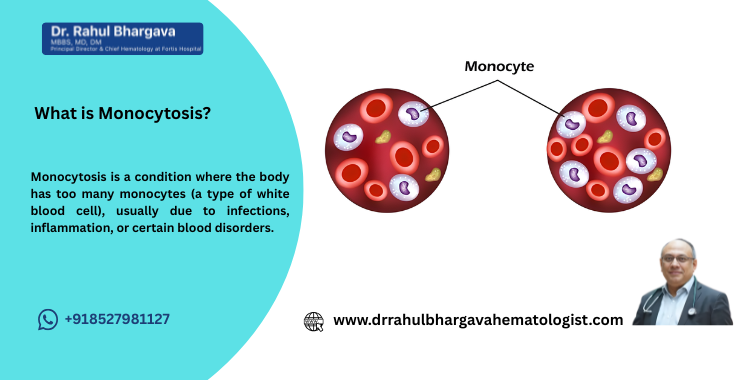Monocytosis Treatment in India

Monocytosis is a condition characterized by an elevated number of monocytes in the blood. Monocytes are a type of white blood cell that play a crucial role in the immune response by engulfing and digesting pathogens (such as bacteria and viruses), and by helping regulate the immune system. An increase in monocytes can indicate an ongoing infection, inflammation, or an underlying medical condition. Monocytosis is generally defined as a monocyte count higher than the normal range, which is typically around 2-8% of the total white blood cells.
Monocytosis
Monocytosis refers to an elevated level of monocytes in the blood, which is part of the body’s immune response. Monocytes help fight infections and remove dead or damaged cells, but when their levels are too high, it may signal an underlying health condition.
Dr. Rahul Bhargava, a renowned haematologist, explains that timely diagnosis and treatment are essential for managing the condition and preventing complications.
Causes of Monocytosis
Several factors can cause monocytosis. Some of the most common causes include:
- Chronic infections (e.g., tuberculosis, syphilis)
- Autoimmune diseases (e.g., lupus, rheumatoid arthritis)
- Inflammatory conditions
- Certain types of cancer (e.g., leukemia, Hodgkin lymphoma)
- Recent recovery from infections
- Bone marrow disorders
- Stress or severe emotional distress
Understanding the cause is essential in determining the appropriate treatment plan.
Types of Monocytosis
Monocytosis can be classified into two main types:
- Reactive Monocytosis: This occurs due to infections or other inflammatory conditions. Once the underlying condition is treated, monocyte levels typically return to normal.
- Malignant Monocytosis: This is associated with blood cancers like chronic myelomonocytic leukemia (CMML) or acute myeloid leukemia (AML), requiring specialized treatment.
Dr. Rahul Bhargava specializes in the diagnosis and treatment of both types of monocytosis.
Symptoms of Monocytosis
Monocytosis itself may not cause symptoms, but it often points to an underlying condition. Common symptoms associated with the causes of monocytosis include:
- Persistent fatigue
- Unexplained weight loss
- Fever or frequent infections
- Swollen lymph nodes
- Joint pain or swelling
- Night sweats
If you notice any of these symptoms, it is crucial to seek medical advice for further evaluation.
Diagnosis of Monocytosis
Diagnosing monocytosis typically involves:
- Complete Blood Count (CBC): This test checks the overall levels of blood cells, including monocytes.
- Bone Marrow Biopsy: If cancer or bone marrow disorders are suspected, this test helps in confirming the diagnosis.
- Additional Tests: Based on the underlying condition, tests like imaging studies, infection screening, or autoimmune tests may be recommended.
Dr. Bhargava emphasizes a thorough diagnostic process to determine the root cause of monocytosis, allowing for precise treatment.
Treatment for Monocytosis
The treatment for monocytosis depends on the underlying cause:
- Infections: Antibiotics or antiviral medications may be prescribed.
- Autoimmune Diseases: Immunosuppressive drugs and other therapies are used to control inflammation.
- Blood Cancers: Chemotherapy, targeted therapy, or bone marrow transplants might be necessary.
Cost of Treatment and Stay in India
The cost of treating monocytosis in India is significantly lower than in many Western countries, making it an appealing option for medical tourism. Treatment costs can vary based on the underlying cause of monocytosis, such as infections, autoimmune diseases, or blood cancers. Below is an overview of the typical costs involved:
-
Initial Consultation:
USD: $30 – $100
INR: ₹2,200 – ₹7,400 -
Blood Tests (CBC, Bone Marrow Biopsy, Infection Screening, etc.):
USD: $50 – $200
INR: ₹3,700 – ₹14,800 -
Treatment for Infections (Antibiotics/Antiviral medications):
USD: $50 – $500
INR: ₹3,700 – ₹37,000 -
Autoimmune Disease Treatment (Immunosuppressive drugs, etc.):
USD: $100 – $1,500 per month
INR: ₹7,400 – ₹1,10,000 per month -
Blood Cancer Treatment (Chemotherapy/Targeted Therapy/Bone Marrow Transplant):
USD: $12,000 – $24,000
INR: ₹10,00,000 – ₹20,00,000 -
Hospital Stay (per night):
USD: $25 – $200
INR: ₹2,000 – ₹15,000 per night
India offers high-quality medical care at affordable rates, providing excellent treatment options for monocytosis, whether caused by infections, autoimmune conditions, or blood cancers. The overall cost is much lower than in Western countries while maintaining world-class medical standards.
Frequently Asked Questions
A monocyte count above 800 per microliter of blood is generally considered high, but the range may vary depending on the lab.
Yes, monocytosis can be linked to blood cancers like leukemia. Further tests are necessary to confirm the diagnosis.
Monocytosis itself is not life-threatening but may indicate a serious underlying condition, which requires treatment.